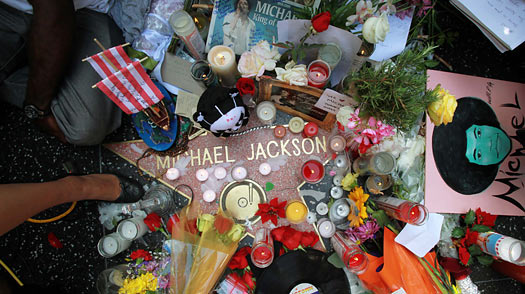
A sidewalk shrine of mementos, flowers, candles and notes adorn the star of Michael Jackson on the Hollywood Walk of Fame in Los Angeles.
(3 of 3)
Jackson longed to please people and worked hard at it all his life: he tried to satisfy his demanding and abusive father, his insatiable fans, his own bottomless ambitions. All those long rehearsals for his London comeback were typical; after all, this was a man who literally burned in service to pop culture — his hair famously caught fire as he filmed a Pepsi commercial in 1984 — and who routinely performed through injuries. Yet for so public a figure, Jackson was socially awkward, inept at small talk and terrified when the distant audience became an adoring mob. Donald Trump told TIME that Jackson used to drop to his knees to crawl away from maniacal fans after concerts. "I guess the stress, the anticipation and the passion he was emitting, wanting to do this comeback so badly, maybe that got to him," Jackson's friend Uri Geller, an illusionist, told the Press Association.
The second act reached its apogee when the Rev. Al Sharpton appeared in front of New York City's Apollo Theater, where Jackson had performed as a child and where traffic slowed to a crawl the day he died, to place him in a highly flattering historical context: "Way before Tiger Woods, way before Oprah Winfrey, way before Barack Obama, Michael did with music what they later did in sports and in politics and in television."
Probably true. Yet as we all witnessed while Jackson's career played out, the star was never comfortable in his own skin. Even as Sharpton spoke, Facebook and other sites were host to raucous debates about whether the instant hagiography wasn't minimizing too many troubling details. Jackson had lived as a man frozen in puberty — his voice a weird falsetto, his hand continually grabbing his crotch, his clothes sometimes stitched with faux military regalia of the sort that should interest only a boy. For a while, a constant companion was a chimp called Bubbles. When he died, Jackson was heavily in debt, a man beset by financial and legal predicaments caused largely by his inability to control his enthusiasms for expensive baubles and inviting little boys to his bedroom. He paid a reported $20 million to settle one case brought by an alleged sexual-abuse victim.
The third and final act takes longer: we set emotion aside and let investigators do their work. The thousands of flowers left outside the Manhattan apartment building where John Kennedy Jr. resided had long withered when the final reports on his plane crash were issued. So it will be with Jackson: now we wait for the blank parts of the day he died to be filled in.
By his death, Jackson had — like many wealthy people — accumulated "friends" who turned out to be knaves or useless hangers-on. (On her blog, Presley called them "the awful vampires and leeches he would always manage to magnetize.") One associate has been portrayed in the press as a physician, but it's unclear whether he has a medical license. Jackson was often sued by employees who may have been looking for a quick buck. His death may well be accidental, but investigators and journalists will spend months determining whether it could have been prevented if those around him weren't so often using him as an ATM.
Although his family has other issues to attend to — custody of Jackson's three kids as well as the ruins of his empire — it will doubtless ensure a thorough inquiry. The L.A. authorities autopsied the body June 26, but the coroner won't release a final report for weeks. In the meantime, those accused in the media of abetting Jackson's decline will surely highlight the star's appetites. After all, they might point out, this is a guy who settled in 2007 with a Beverly Hills pharmacy that claimed he owed an astonishing $100,000 for prescriptions it had filled.
On the day he died, many who knew Jackson described him as "gentle," which seemed to be a kind of code, an explanation, an excuse. In fact, he seems more like a character in a show he had no control over, a boy turned into a man too soon and a man who tried to become a boy all over again. His greatest performance may have occurred June 25, when sudden death ensured that we will always wonder who he really was. —Reported by Barbara Kiviat, Tim Morrison, Alice Park and Andrea Sachs / New York and Alison Stateman / Los Angeles